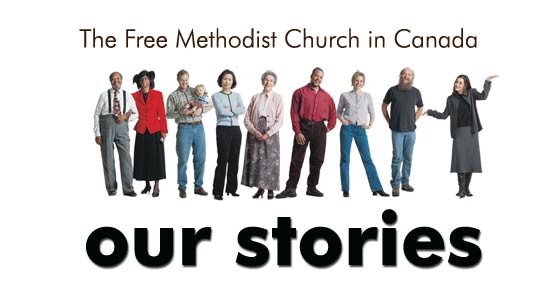Alan Hirsch, author of "The Forgotten Ways" and contemporary Missional Church thinker, says the current church has itself turned around backwards. The natural flow of the gospel that a proper Christology [understanding of Christ] gives rise to a compelling Missiology [understanding of our mission] which needs a proper Ecclesiology [understanding of the church] to support that Christ inspired mission. According to Hirsch much of the church growth movement starts with Ecclesiology, and finds a Missiology to grow and support the church, in an effort to move closer to Christ. In this model, evangelism and/or "missions" becomes a program of the church and not its reason for existence. Hirsch proposes that church must recover the natural flow of the gospel [Christology->Missiology->Ecclesiology].
Historically, the gospel was flowing in the right direction in the Methodist church. Wesley’s revival began with a series of encounters with Christ that compelled his evangelistic campaigns. From that mission the Methodist church was born to support Methodists as they spread the gospel further and deeper into the world. This trend did not end with the Methodists but was rediscovered in the work of the early Free Methodist movement. An overwhelming majority of our churches were planted to support the success of Free Methodist revival meetings in the end of the 1800s and first part of the 1900s.
In light of the present state of the church, Hirsch and many of his contemporaries are calling for the church to become "Missional". "Missional" is a term and way of thinking developed by Lesslie Newbigin which demands that the church exists for the purpose of its Christ-compelled mission. Not the other way around. While the word "Missional" suffers from buzzword status in much of the broader evangelical world, it should never suffer a similar fate inside the Free Methodist Church. Historically and traditionally speaking, to be truly Free Methodist is to be "Missional".
So how do we recover the natural flow of the gospel in our movement? Here are a few suggestions:
Rediscover Christ
This may sound trite but is absolutely essential. We serve a missionary God. We should become a missionary people. We serve a sent-out Saviour. We should be sent out as well if we’re following in his footsteps.
We must make a long term, concerted, and consistent attempt to reshape our church culture.
As a movement we have not grown significantly for nearly 70 years. We are resting on the laurels of our missionary past. While that is beginning to turn around, our churches are currently dominated by a culture focused on maintenance and care rather than our mission in Canada. To change this we will need to take a fearless look at ourselves! That will mean a consistent and public "taking stock" of where most of our time, energy, and resources are being focused. Is it on ourselves? Is it on our mission to those not in the family of God? We will also need regular congregation wide conversations about how we can start re-aligning our values and hearts around the missionary task our missionary God is leading us into.
Recover and heed the voice of the apostles, prophets and evangelists among us.
The Bible talks about the Holy Spirit giving the church apostles, prophets, evangelists, preachers, and teachers for its on-going vitality and health. The church tends to go into maintenance mode when the preachers and teachers become the dominant leaders. Why? Because their spiritual gift is the care and nurture of the flock. While they are necessary to the on-going health of the flock they do little to advance the church beyond its four walls. God has given us a complete gift-set among us but we are responsible to give them a voice and listen to what they have to say.
A commitment to church planting.
The truth is the Free Methodist revival meetings began to lose their effectiveness somewhere around the 1930s. This led to a slow down in our growth; a fact we have only recently begun to recover from. After the mid 90s restructuring of our movement, and the hiring of Ron Bonar to keep church planting on the forefront of our national agenda, we have begun to see a long-term downward trend begin to reverse. Church plants by their very nature tend to embody the natural flow of the gospel. An encounter with Christ leads many among us to feel a burden for a unreached group of people in our society. That burden leads to compulsion to a "do something about it". When something effective and useful is "done about it" a church is born. If we can maintain a commitment to seeing every church plant a church we will see a new day in The Free Methodist Church in Canada. We will see a resurgence of the best of our traditions and history.
I am convinced that we are currently taking some of the right steps to see our denomination become "missional". However, it’s going to take time and patience. It will take all of our churches taking God’s mission as their own. It will take courage as we face the brutal facts about our attitudes toward the needs of our neighbours and our choice to focus instead on ourselves. It will take action and prayer as we work to live in more Christ-shaped ways. Most importantly, it will take Jesus keeping His long standing promise to build His church.
Rev. Jared Siebert is the Director of Growth Ministries for The Free Methodist Church in Canada. Resources are available at www.lifecycleproject.org
skip to main |
skip to sidebar


Blog Archive
-
▼
2008
(11)
-
▼
March
(9)
- Training leaders in Cambodia
- Missional Living in Niamey, Niger
- Living A Missional Life - Be intentional with the ...
- Leadership for the Missional Church
- Rev. Kim Henderson appointed as new FMCIC Director...
- Local Churches in Transition have a "Window of Opp...
- The Missional Church
- It’s hard to live in two worlds
- "To be" or "Not to be" Missional is NOT the Question!
-
▼
March
(9)
Links
About The Free Methodist Church in Canada
- Our Ministry Centre is located in
- Mississauga, Ontario, Canada
- The Free Methodist Church is a movement of Christian congregations all across our country that are committed to sharing the good news of faith in Jesus Christ and encouraging believers into a life of ongoing transformation that impacts our families, our communities and our nation.

No comments:
Post a Comment